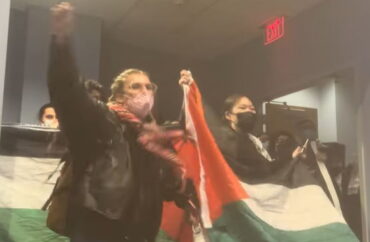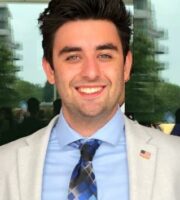
While several observers have questioned why it appears the University of North Carolina-Chapel Hill’s Students for Justice for Palestine chapter has not been punished for repeatedly disrupting campus events in apparent violation of school policies, the group recently fired back.
UNC’s Students for Justice in Palestine filed a civil rights complaint April 5 with the federal education and justice departments alleging campus leaders are guilty of “discrimination, stereotyping, different treatment, and racial profiling” by favoring the pro-Israel side in messages to students.
“The eight-page complaint also alleges the university has ignored bullying and harassment of Muslim and Palestinian students and those protesting against Israel’s treatment of Palestinians and attacks on Gaza,” NC Newsline reported.
Yet others argue the pro-Palestinian student group is the one that has violated policies throughout the school year.
The group took over a building on campus and shut down its administrative operations for a day, disrupted a guest speech by prominent pro-Israel journalist Bari Weiss, and frequently interrupted a recent Board of Trustees meeting.
The protest of Weiss violated a UNC policy protecting free speech, according to a watchdog that filed a complaint against the student group.
Speech First submitted a formal complaint to the university calling on it to “initiate disciplinary proceedings against all students who participated” in the late January protest of Weiss, who was on campus to promote “a discussion of objectivity in journalism.”
The complaint accuses SJP of shutting down speech and engaging in a “heckler’s veto,” wrote Cherise Trump, its executive director.
“Twenty-five minutes into the event, a large number of students flooded the aisles of the auditorium, chanting and shouting down the speakers. The event was brought to a standstill for several minutes until the students—who were warned that they were violating the Campus Free Speech Act—were removed from the room by campus security,” Trump wrote.
On Feb. 27, Speech First submitted a formal complaint to the UNC Board of Trustees about the disruption as well, stating in part: “If students are allowed to shout down speakers with viewpoints different from their own, how does that translate to healthy dialogue and debate in the classroom?”
Trump told The College Fix via email on Thursday that as far as she is aware, no formal punishment has been meted out on SJP.
Asked for comment, UNC’s media relations department told The College Fix on April 10 the institution “is committed to providing an inclusive and flourishing environment for free speech and civil discourse.”
Upon the SJP disruption at the Weiss event, members “were told to leave and were quickly removed from the event,” the department said via email. “The program then continued without further interruption.”
But the Weiss event is not the only SJP controversy garnering concern.
Less than one week after the Oct. 7 Hamas massacre of 1,200 Israeli citizens, on Oct. 12, the organization held a “Day of Resistance Protest for Palestine.” The event’s flier included a depiction of the Hamas paragliders who infamously carried out part of the assault.
At that protest, an “altercation took place as pro-Palestinian and pro-Israel students held dueling demonstrations at the University of North Carolina Chapel Hill on Thursday in an event that started at about 50 students and grew to 500,” The College Fix reported at the time.
At one point, UNC religious studies Professor Evyatar Marienberg walked into a group supporting Palestinians as he hoisted a large Israeli flag and was pushed away by the protesters, a video taken by the WRAL news station shows. He was escorted away by police when he would not leave, WRAL reported.
On Nov. 18, SJP took to X claiming, “ A GROUP OF ABOUT 40 MEMBERS OF SJP AND ALLIED ORGANIZATIONS OCCUPIED SOUTH BUILDING FOR A TOTAL OF 3 HOURS, SHUTTING DOWN ADMINISTRATIVE OPERATIONS FOR THE DAY.”
More than 100 masked protesters chanted, marched, then took over an administrative building as part of the demonstration, The Daily Tar Heel reported.
Most recently, on March 21, SJP members repeatedly disrupted a UNC-CH Board of Trustees meeting, a video of the meeting shows.
During the meeting, UNC Professor Emily Putnam-Hornstein presented the board with a series of prior incidents involving SJP on campus that raised concerns about their actions.
Putnam-Hornstein also voiced frustration at the apparent appeasement of the group, saying that as the students took over a campus building, “members of our administration facilitated water delivery and conceded to other demands.”
Another example offered by Putnam-Hornstein was an Oct. 12 incident where The Daily Tar Heel noted the presence of “around 80 pro-Palestine protesters” and that “many…wore masks to conceal their identities.”
Putnam-Hornstein pointed to a state law that forbids mask-wearing during protests.
Trump, in her complaint, argued that “Campus policies and State laws that protect the right to free speech on campus mean nothing if they are never enforced.”
According to a Jan. 2 op-ed in the Algemeiner, the Department of Education’s Office for Civil Rights has also “opened an investigation to determine if UNC “responded to alleged harassment of students based on national origin (shared Jewish ancestry) in a manner consistent with the requirements of Title VI.”
MORE: Avoid term ‘peanut gallery,’ UNC dorm group social justice training warns
IMAGE: YouTube screenshot





Please join the conversation about our stories on Facebook, Twitter, Instagram, Reddit, MeWe, Rumble, Gab, Minds and Gettr.